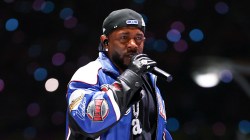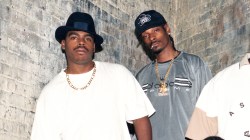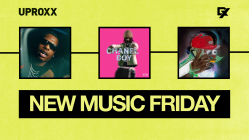GlorRilla’s “F.N.F.” is the kind of hit artists spend their entire careers chasing after. The braggadocios track is a viral smash, a Billboard hit, a Grammy-nominated record and an easy contender for 2022’s song of the year. The Memphis rapper followed one hit with another, delivering the Cardi B-assisted “Tomorrow 2.” With these two smashes, she’s seemed to usher in a new era for women in Hip Hop: one where the most successful female rappers are loved not only by women, but by men too.
Her debut EP Anyways, Life’s Great makes the case that she’s one of the most exciting new rappers of any gender, despite the EP not always matching the lofty promises of her hit singles. Yet even at its lowest points, Anyways, Life’s Great showcases a thoughtful ear for Memphis beats and Glo’s pocket-seeking flow, offering glimpses of the superstar she may soon become.
GloRilla starts the EP speaking on uncertainty with her purpose in life, but even with doubts she’s straightforward whether discussing clout chasers or a past abortion. That song, “No More Love,” sports a hazy beat courtesy of ATL Jacob, and GloRilla’s flow cuts through the sedated melodies like a G5 through puffy white clouds. Instead of a chorus, there are two spoken interludes, like snippets of a drunk conversation with her homegirls.
The track encapsulates what makes Anyways, Life’s Great so enjoyable. GloRilla isn’t just vulnerable or relatable; she turns her listeners into co-conspirators, whether they’re twerking on headlights or counting blessings together. “Don’t be scared to ask that n**** for some money,” she advises on “Get That Money,” as if she’s sick of watching you get played for the umpteenth time. And the first verse of “PHATNALL” is directly addressed to an ex’s new girlfriend, warning her to get out before he does his new girl even worse than he did Glo.
The EP’s main fault is it’s inconsistency. No song is out right bad, it’s just that GloRilla’s best trumps her good enough work, leaving the listener with a feeling that some of these songs could have been more fleshed out. “Nut Quick” is brash and bossy, but doesn’t come close to the delirious energy of 2021’s “Set It Off.” “PHATNALL” is good, but “Unh Unh” is better, and the beats feel like fraternal twins. “Tomorrow 2” and “Blessed” also have similar sounding instrumentals, but Glo’s varied approaches help differentiate the two.
GloRilla’s voice is distinctive, a lower-register bark that gives her vocals additional heft against harder beats. The extra bass is especially apparent on the remix to “F.N.F.” featuring Latto and JT of City Girls, both of whom seem dwarfed by Hitkidd’s trunk-rattling instrumental. “I tried to sound like a girl rapper,” she told GQ in November. “But when I would rap something in my soft voice then rap in my deep voice, people always preferred that.”
Over the past decade, rap music has grown to support a bevy of mainstream female rappers beyond Nicki Minaj: Megan Thee Stallion of course, but also Doja Cat, BIA and more. As the cohort of women in Hip Hop has expanded, they’ve expanded the boundaries of pop rap and rap as pop music, essentially founding their own subgenre tied together less by sonics and more by aesthetics. Saweetie’s Bay Area raps don’t sound much like City Girl’s Atlanta-centered bars, yet it’s quite likely a fan of one will be a fan of the other.
Despite their chart successes and obvious talent, these artists have largely remained rappers for women (and gay men). Part of this can be chalked up to outright sexism, (“In general, they do try to pit women against each other. They don’t do that to males,” she told Complex in November) both among audiences and within the music industry. But that isn’t the whole story. These rappers often operate in a divergent sonic lane from their equally famous male counterparts, and even when rapping over similar beats, they craft music that finds success from their respective regional touches.
GloRilla brings her own swag and charm to her songs, but her music is undeniably Memphis, fitting neatly alongside music by her CMG labelmates (Blac Youngsta, Est Gee, Moneybagg Yo) and other hometown heroes including Young Dolph, Gangsta Boo and Duke Deuce (who tapped Glo for a standout feature on “JUST SAY THAT” last summer). She’s a beneficiary of the city’s resurgent star as much as she is a beacon drawing curious eyes to its scene, not only good enough to rap with the boys, but genuinely interested in creating similar kinds of music.
So, about that sexism. Some men don’t want to listen to women rap because it’s “unrelatable,” though that dismissal begs the question if they relate to Future buying women APs. More crucially, women in Hip Hop have been held to an unfair double standard by A&Rs, YouTubers, music critics and more. “Oh, you listen to rap? Name 5 songs. Who’s your favorite artist? That’s not real rap.” Female rappers have frequently responded by showcasing intricate wordplay and technical skill.
By contrast, GloRilla is more focused on saying something real, and less concerned with how she says it, whether talking her shit on “Blessed” or baring her soul on “Out Loud Thinking.” It makes sense that she calls herself “the female Chief Keef.” Her straightforward raps put her in good company with Keef’s other acolytes (21 Savage and XXXTentacion come to mind). But while Chief Keef has plenty of descendants in the rap game today, they are almost exclusively men. Megan thee Stallion says Pimp C is her favorite rapper; Latto says she was inspired to rap by Gucci Mane; Nicki Minaj cites Jay-Z, Eminem and of course, Lil Wayne.
Anyways, Life’s Great is distinct from those artists’ work, more akin to Cardi B’s Gangsta Bitch Music Vol. 1 or Katie Got Bandz’s Drillary Clinton tapes. GloRilla isn’t exempt from the sexism her fellow artists have faced, but when clubs full of men are screaming along to “F.N.F.” and “Munch” by NY drill princess Ice Spice, it feels self-evident that the glass ceiling is shifting, if still intact. GloRilla’s music is hard in a way her male contemporaries’ music is hard, without sacrificing her femininity or shying away from a woman’s perspective. It’s like she says on the hook of “Unh Unh”: haters might think her 15 minutes of fame are over, but she’s only getting started.





![50 Cent Shares Unseen Diddy Footage From Netflix Documentary: "[It] Shows You His Character"](https://hiphopdx.com/wp-content/uploads/2025/12/50-cent-diddy-documentary-trailer-unseen-footage.jpg?w=250)




Album is trash
Mennnn music has changed. This girl is so trash yet here you are bigging her up. Its ridiculous. She’s literally the most trasheiest female mc. It hurts to listen to her. Goddamn. She’s actually worse than Megan. And here you are. Fuck you hiphopdx. You guys are trash